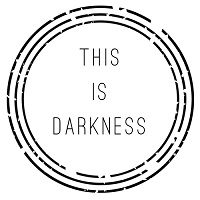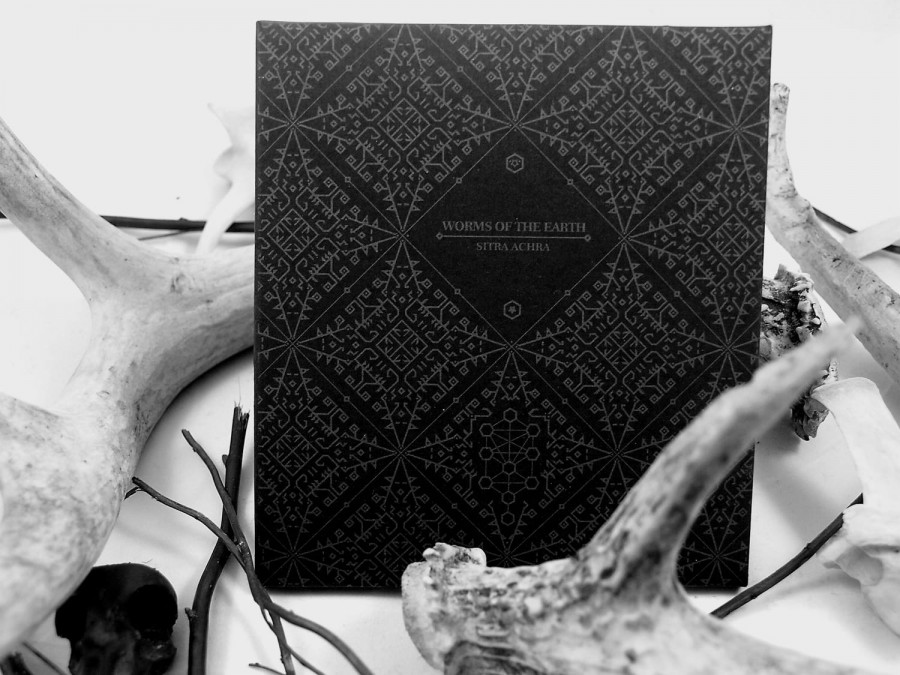Dan Barrett is the man behind Worms of the Earth. Over the last few years he has covered a lot of different ground with his musical project Worms of the Earth. While dark ambient has always been close to his heart and a staple of his music, he’s never afraid to blend and even traverse into new territory and different genres. He told me that he had a sale going on, 40% off his last two full length albums, Sitra Achra and Azal’ucel. He set this sale in motion as a nod to his previous accomplishments, but also as a notification of the rebirth of Worms of the Earth. Curious about the changes in store, and wanting to let readers know about these two excellent albums, I decided to interview Dan. You should really get to know a lot about Dan’s background as a musician, and the level of seriousness and spiritual energy he has put into the project over the years. So let’s get into the interview!
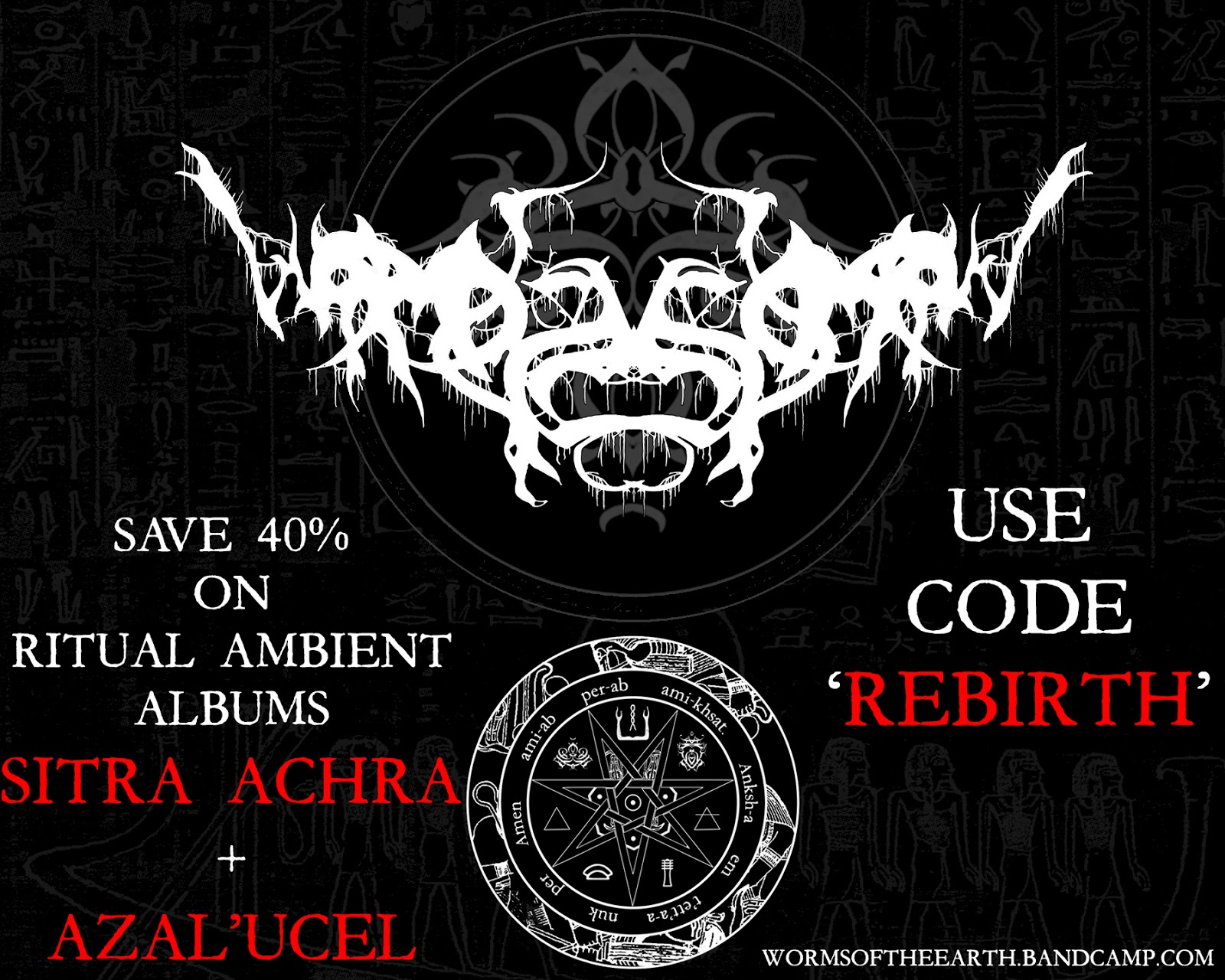
Interview with: Dan Barrett
Conducted by: Michael Barnett
Michael: How long has Worms of the Earth been an active project?
Dan: I had been messing around with writing electronic music for a few years, but I didn’t take it seriously until about 2007. That was when I first distributed a demo to other people & started playing live and it dawned on me that “hey, maybe I should pursue this as a serious hobby”.
Michael: During this initial phase were you using the same sorts of programs and instruments to write your music, or has this evolved as new technology and hardware have become available over the years?
Dan: I think I took the opposite path of most bands. A lot of guys working in similar genres started entirely with hardware and then moved towards more software because it’s easier and cheaper, whereas I started with all cheap software and as I got more into writing music bought hardware. In the early stages of Worms of the Earth it was all the garbage you’d expect: Fruity Loops 3 or 4, Vanguard, Vengeance sample packs, and whatever other hot pirated VSTs of the time. But I’ve always felt like hardware sounds better; it just has more character or soul or whatever you want to call it. A good filter just can’t yet be replicated in software. So anyway, I’m using a combination of hardware and software now but it’s all totally different than in the beginning. For hardware I’m relying heavily on the Nord Lead 2, Virus rack, and Virus TI for my synth needs and the Roland JV2080 + expansion cards and Korg Trinity for rompler stuff: strings, pads, ethnic instruments. For software I’ve been getting into LuSH-101 and Superwave Ultimate (something of a JP8080 clone) and I use EastWest VSTs a lot. I have more gear but those are my favorite tools. I’ll probably sell the Virus TI Snow soon and buy a couple of the new analog synths – an enormous amount of cool shit has come out recently.
Michael: Your music as Worms of the Earth has always had a bit of variety and didn’t necessarily fit into specific genre categories. I’ll be referring to it in this interview as a dark ambient project, but I’m aware the sounds often move outside that genre. Up until this point, how would you describe your sound as Worms of the Earth?
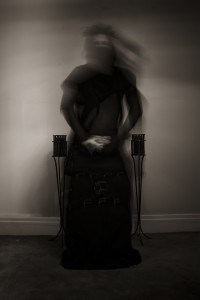 Dan: I’m a fan of many different types of music so it’s been difficult for me to stick to one particular sound. I also find that as a producer it greatly bolsters your abilities and keeps your creativity flowing to write different styles of music. And frankly, it’s just boring to write the same thing and the same sounds over and over. That said, I eventually settled on “ethno industrial & ritual ambient” to describe Worms of the Earth.
Dan: I’m a fan of many different types of music so it’s been difficult for me to stick to one particular sound. I also find that as a producer it greatly bolsters your abilities and keeps your creativity flowing to write different styles of music. And frankly, it’s just boring to write the same thing and the same sounds over and over. That said, I eventually settled on “ethno industrial & ritual ambient” to describe Worms of the Earth.
My albums run the gamut from industrial to power noise to tribal to dark ambient, but behind that there are consistent currents that run through all the releases. At it’s core I am trying to make interesting, spiritually potent music that combines all the things I like about different genres.
Michael: As I’m not particularly familiar with some of these other genres, and maybe some readers aren’t either, would you please explain how the “ethno” part works within the context of your sounds?
Dan: Ethno = tribal/ethnic/world sounds. Basically just infusing ethnic melodies/instruments and percussion into my stuff. It’s mainly been used as accents thus far, although songs like “18 Hands Of Cundi” have that stuff as a focal point.
Michael: How long have you been interested in dark ambient music?
Dan: To be honest I’m not really sure when, specifically, I discovered dark ambient. I remember in high school discovering industrial and IDM which somehow led to finding and being captivated by songs like Coil’s “Dark River”. Then at some point later – I don’t remember where it came from, but I just had In Slaughter Natives and Desiderii Marginis on my hard drive. I’ve always been drawn to atmosphere in music – in fact I think that is the most important characteristic. So I think getting into dark ambient was inevitable. It also helped that, for whatever reason, the power noise genre of the late 90s, early 00s was closely linked to dark ambient – labels like Ant Zen and producers like Iszoloscope and Ah Cama-Sotz were instrumental in fostering my love of the genre. I’ve got to give credit to Miguel from Connexion Bizarre as well; I was writing reviews for him years ago and he kept pushing the dark ambient stuff on me because no one else was covering it, haha. That exposed me to great labels like Cyclic Law and Malignant. Additionally, my girlfriend of many years (who I met through Connexion Bizarre oddly enough) is also a big fan of dark ambient and that was a major point of bonding between us. So she filled in the gaps of some of the stuff I had been missing out on, introduced me to Fred from Cyclic Law, and so forth.
Michael: Which artists have had the most influence on you before and during your career as a musician?
Dan: There have been a lot; like I mentioned I listen to a lot of different stuff. But I think Iszoloscope, Ah Cama-Sotz, and This Morn Omina probably had the biggest effect on me – guys that were mixing together all the styles that I loved (industrial/power noise, dark ambient, and tribal – with an occult slant).
Michael: Since you mention the occult slant on these genres here, what does the occult mean to you on a personal level? Do you consider it a point of interest or does it permeate your being with its religious components?
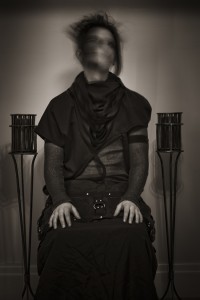 Dan: Hidden knowledge, wisdom. Magic. Basically the knowledge of our connection to and place within the universe, which has been lost over the ages. And the knowledge of how to be free from negative bindings, seen and unseen. When you’re a practicing magician (for lack of a less cheesy term), and you’ve achieved a level of awareness then you live magic. I can’t really explain it better than that. It’s not so much permeating my being as becoming aware of something that’s already there.
Dan: Hidden knowledge, wisdom. Magic. Basically the knowledge of our connection to and place within the universe, which has been lost over the ages. And the knowledge of how to be free from negative bindings, seen and unseen. When you’re a practicing magician (for lack of a less cheesy term), and you’ve achieved a level of awareness then you live magic. I can’t really explain it better than that. It’s not so much permeating my being as becoming aware of something that’s already there.
Michael: What territory do you expect future Worms of the Earth albums will move into?
Dan: The new stuff I’m working on is predominately Goa/Psytrance, and I’m utilizing the tribal components even more. It’s not a total departure from past work however, there are still industrial and ambient elements. This may seem strange, but in the context of Worms of the Earth thematically it makes complete sense. Azal’ucel was the first true magical album I did – the call to the higher self, opening the gateway to connect with it. That was successful and Azal’ucel was the most well received of any Worms of the Earth album, despite being a huge departure from previous material. That awakening made me realize that I was being held back by something; creatively and mentally blocked. So, to address that I worked on Sitra Achra in which I explored the darkness and chaos of my own psyche, plunging into qliphothic realms. This was the most difficult and destructive album, but it illuminated to me the darkness of this world, so to speak, and I was able to understand how truly consumed by and mired in this darkness I was. So after descending into the depths and, metaphysically, destroying myself (and the project along with it, since it is ultimately an aural projection of myself) I kind of thought Worms of the Earth was over; but later I realized that this breaking down was essential to truly move beyond the darkness that was inhibiting me. After that I did The Nightside Of Creation EP, which was the end of my working with the qliphoth and moving beyond it. It didn’t fully make sense to me at the time, but when looking back it makes complete sense in the context of my spiritual progression. I was leaving the blackness and emerged into this “desert” – solar magic, the scorching heat of desert air (air & fire; the return of intellect and will) and the sturdiness of earth, etc. After doing the destructive rituals via Sitra Achra I was looking to ascend from the darkness of nigredo and this journey set me looking for a true source of magic, which naturally led me to old kingdom Egypt which is regarded as the last truly magical society (again: desert, solar energy, etc). So the new WotE material is about the rebirth of myself and, by extension, this project. I’m writing about the Am-Tuat which in Egyptian mythology chronicles the sun god Ra’s journey each night into Amenta (the hidden place) after the sun sets. Here he sails his boat (Sektet) through 12 realms during “the 12 hours of night”, eventually being reborn as the sun (Ra in his Khepera form) when it rises the next day.
Musically speaking, this new material marks a progression in many elements of the music. My goal since the emergence of WotE was to write really complex, meaningful, and potent dance music, and I feel that psytrance is a style where I can accomplish that. In a lot of ways I feel like goa/psy is the last bastion of complex, intelligent dance music. I love that this is a genre where it’s not only acceptable but essential to write long songs with lengthy intros, breakdowns, layer upon layer of melody, and spiritual elements & themes. Additionally, I feel like the standards for production and sound design are high, so it pushed me to work hard in order to improve my own knowledge of synthesis and sound design. I’m really excited about the new material, I think it’s quite different from what people are making and I hope that this new combination of sounds will resonant with others in the way it does with me.
Michael: You mention that Azal’ucel was your first true magical album. Do you consider the writing, performing and/or listening of this album to be part of a religious experience for you and/or your listeners?
Dan: Spiritual experience, yes. I wouldn’t say religious, to be succinct: religion is bullshit. But yeah, the process of creating Azal’ucel was definitely something profound. For me first and foremost of course, because it involved rituals I did for my own development so it’s going to connect with me in a specific way. But it’s a magical work that will resonate with people who are open to it. Even those who are not attuned to “magic” stuff will, I think, recognize an unseen depth to it that is lacking on other albums. When I was younger I used to experience this with Coil albums, for example.
Michael: Can you elaborate on what you mean when you mention the terms qliphoth and nigredo for those of us not well versed in this topic?
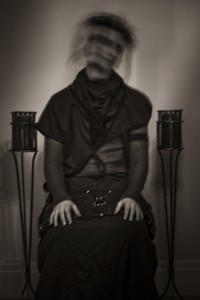 Dan: To explain qliphoth first we have to talk about the Tree of Life in Kaballah. Now I’m not going to go into that because that’s a colossal thing on it’s own and is generally interpreted in a few different ways to symbolize myriad profound concepts (as in, the universe, man’s place in the universe, etc). But to keep it extremely concise: the Tree of Life is a map of 10 spheres, which represent “traits of god”: wisdom, benevolence, and so forth – basically, useful, positive traits. Qliphoth is the inverse of the Tree of Life, and the realm is called Sitra Achra. In this realm the 10 spheres represent “the failures of god”, which are basically chaotic and negative traits. Not EVIL per se, but either purely negative traits or good traits which get corrupted / become detrimental; these traits can cause us to lose willpower, creativity, connection with the divine source, etc. Again, the qliphoth can be viewed in a number of ways, but that’s the basics as it relates to the album. In short, when working with the qliphoth you are confronting the shadow; all the negative traits you carry and are connected to.
Dan: To explain qliphoth first we have to talk about the Tree of Life in Kaballah. Now I’m not going to go into that because that’s a colossal thing on it’s own and is generally interpreted in a few different ways to symbolize myriad profound concepts (as in, the universe, man’s place in the universe, etc). But to keep it extremely concise: the Tree of Life is a map of 10 spheres, which represent “traits of god”: wisdom, benevolence, and so forth – basically, useful, positive traits. Qliphoth is the inverse of the Tree of Life, and the realm is called Sitra Achra. In this realm the 10 spheres represent “the failures of god”, which are basically chaotic and negative traits. Not EVIL per se, but either purely negative traits or good traits which get corrupted / become detrimental; these traits can cause us to lose willpower, creativity, connection with the divine source, etc. Again, the qliphoth can be viewed in a number of ways, but that’s the basics as it relates to the album. In short, when working with the qliphoth you are confronting the shadow; all the negative traits you carry and are connected to.
Nigredo is from alchemy which is another core component to my music. Nigredo is the first phase. In a regular alchemical sense it means decomposition or putrefaction; it’s where the alchemist cleanses and cooks a thing into a uniform black matter before it can eventually be transmuted into the end result of gold. In a spiritual sense it’s basically the initial phase of spiritual development where you confront the shadow (negative) aspects (see above^) of yourself so that you can conquer them and proceed to ascension.
Michael: Does your belief structure apply itself to your music and vice-versa?
Dan: Yes, absolutely. Worms of the Earth is the aural representation of my spiritual journey and sometimes ends up being an auditory ritual to aid in whatever spiritual goal I’m pursuing.
Michael: Do you follow a specific religious order or do you borrow concepts from various disciplines?
Dan: I’m a very isolated person so I don’t have any interest in joining a lodge or temple or whatever. Magic and “occult stuff” is extremely personal in my opinion and the stuff you do will largely only hold meaning to you and will be irrelevant to others.
In terms of concepts, every path is basically working with the same fundamental ideas, but they’ve been filtered through a person or people’s experiences – so to the initial scribe the ideas no doubt held significant meaning, but as each passing generation moves further from that initial experience then the ideas become increasingly more abstract and ambiguous. But in the end it doesn’t matter what you follow because once you drill down past the extemporaneous crap and find the core concepts, the things that really resonate with you on a metaphysical level, they are intrinsic to this existence. A significant part of process of studying magic is filtering through all the bullshit and finding the stuff that resonates with you specifically, and in the end you realize that it doesn’t really matter how you got there.
Michael: Do you feel you’ve exhausted your inspiration as a dark ambient musician or are you just wanting to try something fresh?
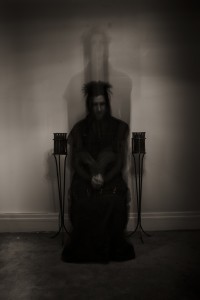 Dan: Absolutely not, I love dark ambient. It’s a core component of my sound and there are plenty of elements of it in the new material. There will be a couple of dark ambient interlude tracks and I’m hoping to close the album with a fully ambient track. I tend to work in cycles; I’ll do some beat-oriented material and then when I’ve written that album and exhausted my creativity I’ll work on a dark ambient album to bring the fire back and get inspired in a different way. I like to use different genres to explore alternate facets of a topic. I don’t know exactly what the future holds, but at a minimum there will always be elements of dark ambient in my music and perhaps more full length dark ambient albums. I’d love to do a full length album of ancient Egyptian themed/sounding ambient.
Dan: Absolutely not, I love dark ambient. It’s a core component of my sound and there are plenty of elements of it in the new material. There will be a couple of dark ambient interlude tracks and I’m hoping to close the album with a fully ambient track. I tend to work in cycles; I’ll do some beat-oriented material and then when I’ve written that album and exhausted my creativity I’ll work on a dark ambient album to bring the fire back and get inspired in a different way. I like to use different genres to explore alternate facets of a topic. I don’t know exactly what the future holds, but at a minimum there will always be elements of dark ambient in my music and perhaps more full length dark ambient albums. I’d love to do a full length album of ancient Egyptian themed/sounding ambient.
Michael: Ager Sonus recently released Book of the Black Earth, which focuses heavily on ancient Egyptian themes. Does this album resonate with you or do you find the theme isn’t well represented by the sounds?
Dan: I was really excited when I heard about that one, but to be honest, to me it just sounds like a regular drone album and I didn’t get any kind of Egyptian or even middle eastern/related ancient society vibe from it at all. The best “ancient middle eastern” album in my opinion is Herbst9 – Buried Under Sand And Time. It’s based on Sumerian themes, not Egyptian, but it impeccably captures the sound and feel of the ancient world.
Michael: Has your interest in the dark ambient community, as a whole, diminished? Or, do you just feel that your own personal output needs to move in a different direction?
Dan: One thing I really like about dark ambient is how…unchanging…it is. What I mean is that it exists in its own kind of ‘pure’ realm and is completely unaffected by trends, drama, etc. People write and listen to dark ambient because they love it and genuinely connect with it, the themes, or whatever. And no one will ever score cool/trendy points for pretending to be into it. That said, one negative thing is that there really isn’t much of a “community” for it beyond people who talk on the internet here and there. Most of the fans I know are involved in a different scene but “also like dark ambient” if you get what I mean. Anytime I have been to an event (and this is probably different in Europe where they actually have dark ambient festivals), it’s always been “genre x, y, and also some dark ambient”. So to answer your question, my interest in the community is the same, but I don’t really think much of a specific “dark ambient” community exists to be interested in. If anything it’s more of a “post-industrial” scene, but even that is quite small here in the US.
Michael: I would have to agree. It seems like most of the “post-industrial” scene in the U.S. comes from the North East and artists like Theologian, The Vomit Arsonist, Compactor and their sort of community. Do you have any connection to any of these guys or their labels?
Dan: Yeah I know all the guys you mentioned and have played shows with them. I did a remix for the Theologian/The Vomit Arsonist split Nature Is Satan’s Church vinyl re-issue that came out last year. Great dudes, all of those guys work really hard and run labels, put on events, and generally support the scene. Lee/Theologian especially, holy shit he has done so much for the scene and booked so many incredible bands! I think that’s one reason that scene does somewhat “well” – a lot of the musicians do things for the scene beyond just producing music.
Michael: I totally agree about Lee Bartow / Theologian [Prime]. I really think he deserves more credit for his efforts in creating tours and festivals, especially here on the East Coast US. Do you see any other large post-industrial scenes here on the East Coast that readers could keep an eye on for attending future events?
Dan: New England and New York City are the big ones where I see events happening pretty frequently. I worked with one of the guys in T.O.M.B. / Dreadlords to put on a couple of Filth Fest events in Baltimore where we had noise/experimental and dark ambient bands play, although that was a few years ago. He moved and left social media so I haven’t been in touch. One of the nicest dudes ever though and it’s great to see them blow up and get signed to Peaceville now! Anyway, I think that Baltimore and Richmond have pretty receptive audiences to this kind of music, but they don’t have a promoter that is doing bigger events consistently like the North East. Additionally, there is a strong techno scene in DC/Baltimore that seems to throw a lot of “industrial techno” events. I haven’t been, but it may be of interest to people.
Michael: Since your music is shifting gears, can we still expect to see your input as a dark ambient journalist in the future?
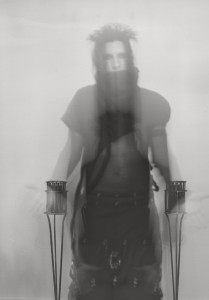 Dan: Most likely yes. I still absolutely love dark ambient and listen to it frequently. In the last few months I haven’t kept up with new releases much, but that’s a thing that ebbs and flows with me. I love having an outlet to use to both write about and promote good music. It’s hard for me to find time to run a zine, write reviews, do interviews, etc., but if I can find time then I’ll likely continue.
Dan: Most likely yes. I still absolutely love dark ambient and listen to it frequently. In the last few months I haven’t kept up with new releases much, but that’s a thing that ebbs and flows with me. I love having an outlet to use to both write about and promote good music. It’s hard for me to find time to run a zine, write reviews, do interviews, etc., but if I can find time then I’ll likely continue.
Michael: Have you done many live shows as Worms of the Earth?
Dan: Yes, quite a few actually! I think I’m up to around 60 or so. That’s one great aspect of working in multiple genres, I can play shows in different scenes for different audiences. When playing live I typically play the more beat-oriented music; maybe because I’m more connected with the industrial scene, or maybe because there isn’t much demand for dark ambient where I live. Playing the upbeat stuff is a bit more engaging anyhow, and seeing the audience react/dance to it is more stimulating than a sea of people standing around (this can still be good, but not quite as good haha).
Michael: How have your experiences been at these shows?
Dan: Well, since WotE was my first real project I’ve experienced the entire spectrum – from shows in dilapidated art spaces with 5 people attending all the way up to playing with Brighter Death Now & raison d’être. It really depends on the space and the audience. I’ve played some terrible places and some great ones. For a long time it was difficult because people had trouble accepting the one man “laptop” performance, but technology has become more pervasive in music & at live shows so people have learned to take it more seriously. In the right atmosphere playing live is one of the best parts of being a musician.
Michael: With WotE switching gears, will you be spending more of your time producing and performing as Venal Flesh?
Dan: Again, it’s cyclical for me. After I’m finished working on a project with WotE then I’ll go and work on something for Venal Flesh to keep things fresh. But it’s more complicated with VF since it’s not just me; it really depends on what the other member VanityKills wants to do.
Michael: Are you already creating new material that reflects your revamp?
Dan: Yes, the new album is almost done! I’ve been working on it for about 2.5 years now. I just started submitting it to labels so we’ll see what happens.
Michael: How soon can we expect to hear samples of this rebirth of WotE?
Dan: I have a clip on Soundcloud and on my Instagram. It really depends on what happens with labels, but I’m planning to post more clips from the studio on Instagram. Obviously, I’d like to get things moving as soon as possible but we’ll see.
Some remixes I did in the last couple years show a glimpse of the new sound, the ones for Venal Flesh and Caustic specifically.
Michael: I briefly mentioned Venal Flesh earlier. Would you like to give a bit of a description of that project and how it differs from WotE?
Dan: Venal Flesh is the joint project of myself and my partner VanityKills. We also have a live keyboardist, Joseph Myers aka DJ Biodread. We’re trying to capture the sound of late 90s, early 00s dark electro like yelworC, Suicide Commando, Aslan Faction, VAC. I love the sound of dark electro and terrorebm, but terror ebm is one of those genres that existed for a short time and no one really took it and evolved it from it’s initial stage (instead a lot of upstarts assimilated the worst characteristics and it devolved into watered down vst trance later called aggrotech). So one of the main goals with this project is to take that sound and push it to the next level; to bring back the darkness and emphasis on atmosphere of albums like Suicide Commando’s Construct/Destruct and yelworC’s Brainstorming. Thematically, it’s very dark and explores some of the most confrontational and painful parts of our psyche. To the extent that it can be difficult to work on the project. The lyrics are all up on the website, you can read them if you want to see what I mean. That’s kind of changing though and the project is getting more into magical and esoteric territory – which seems inevitable since we are both heavily involved in magic.
Michael: Are you involved in any other projects, aside from WotE and Venal Flesh?
Dan: No, just those. I barely have any free time left so I hope I don’t get involved in anything else, haha! That said, I have been working with Henrik from Seven Trees here and there on some dark ambient/death industrial material (you can hear two of our collaborative tracks on compilations from Kalpamantra and Terra Relicta). We are working on a couple of songs for compilations, and we’ve been talking about putting together a full album which will likely happen later this year or early next year. I think that will end up being affiliated with the WotE moniker (and his Subverge moniker) though as opposed to a new entity.
Michael:Thank you very much for your time, Dan. I’ll leave the final words to you!
Dan: Thanks so much for the support!
Worms of the Earth Related Pages: Bandcamp, Instagram, Soundcloud, Facebook
